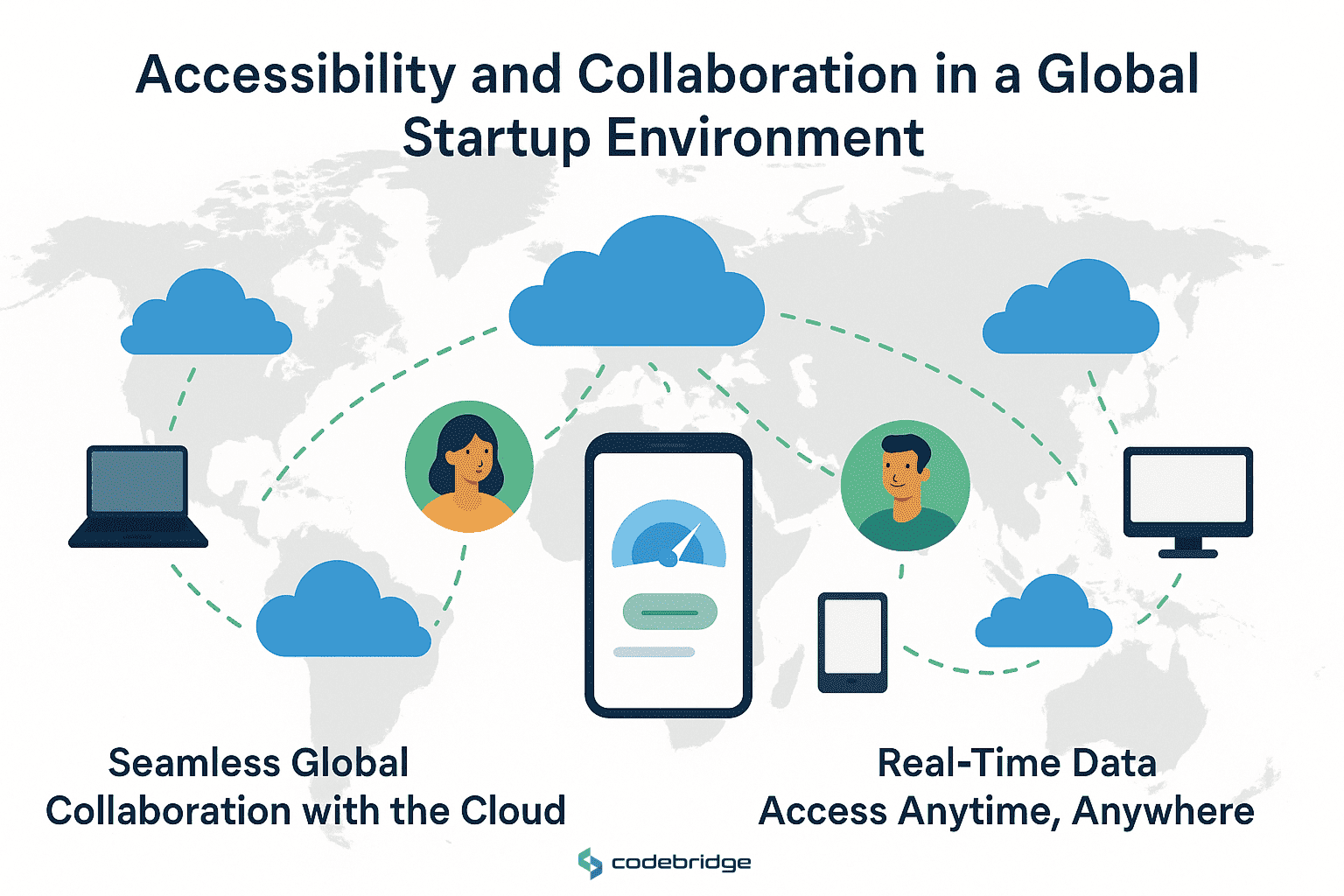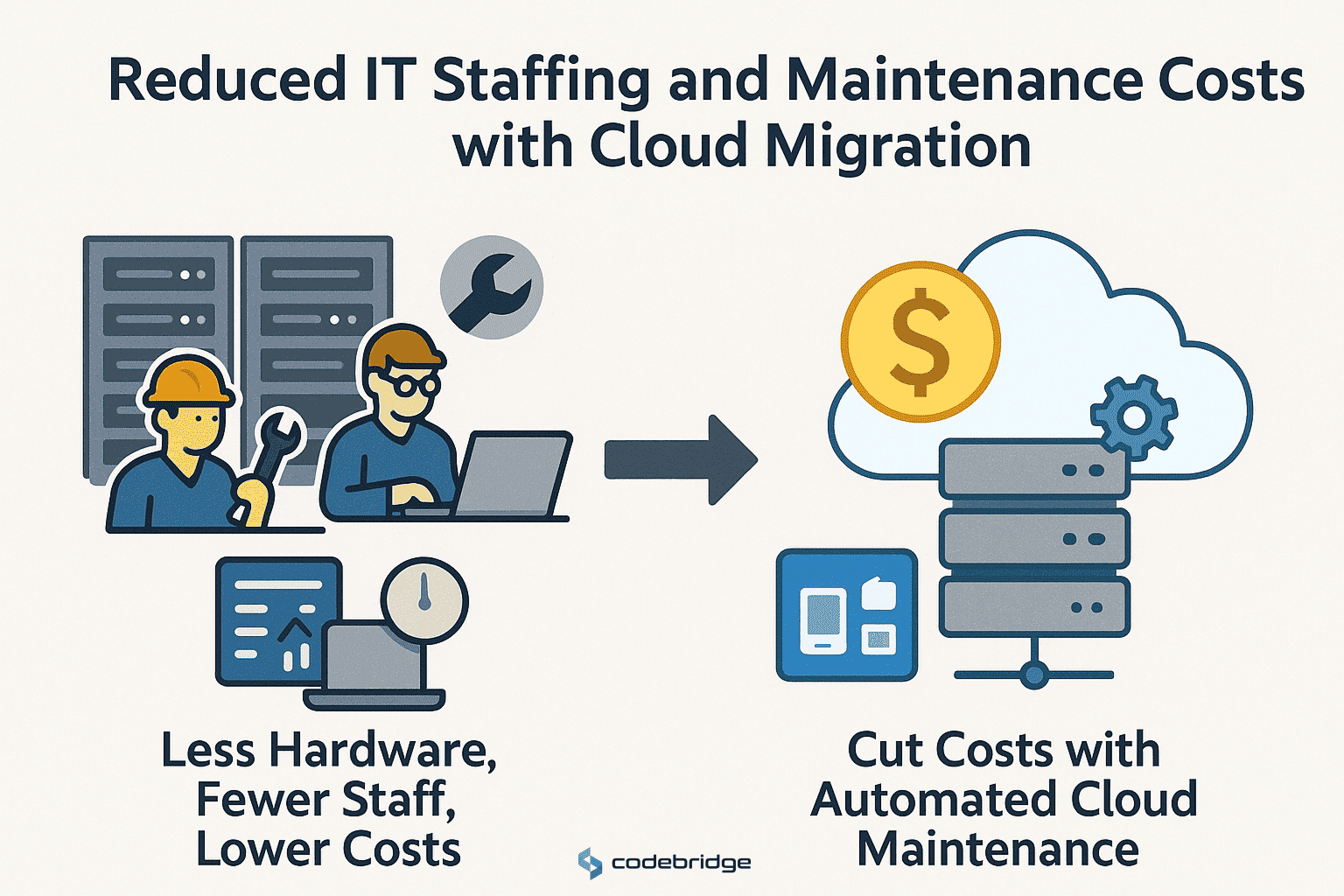Scaling is the dream of every startup. But how do you expand your operations, serve more users, and innovate faster, without stretching your team or blowing your budget? The answer lies in cloud migration solutions.
Startups today are embracing the cloud not just as a storage or hosting option, but as a strategic growth enabler. Migrating to the cloud unlocks agility, resilience, and efficiency that traditional infrastructure simply can't match. And for startups that need to move fast and stay secure, it's become a non-negotiable.
From cutting deployment times in half to allowing remote teams to collaborate seamlessly, the benefits of cloud migration go far beyond just saving on hardware. For expert support throughout this transformation, consider leveraging DevOps services that streamline your cloud migration and optimize performance.

What Are Cloud Migration Solutions and Why Are They Important for Startups?
Cloud migration solutions refer to the technologies, services, and strategies used to move digital assets: applications, databases, storage, and workloads, from on-premise infrastructure or legacy systems to cloud environments.
For startups, this transition isn’t just about moving files. It’s about building an agile infrastructure that supports rapid development, experimentation, and growth. As early-stage companies deal with limited budgets and lean teams, cloud services offer pay-as-you-go flexibility, instant scalability, and tools to compete with the big players.
By migrating to the cloud, startups gain access to robust infrastructure without the upfront capital expense.
It also allows founders and CTOs to focus on innovation instead of server maintenance.
The Role of Cloud Migration in Startup Growth
Startups grow in unpredictable ways. One viral product launch or new client can multiply your user base overnight. Traditional on-premise setups buckle under such demand. Cloud migration for startups provides the elasticity to scale resources on demand, so you’re always ready.
Moreover, many modern tools, analytics platforms, AI APIs, and dev tools are cloud-native. Without cloud integration, startups miss out on this tech ecosystem that’s essential for building competitive products.
So, cloud migration isn’t just a tech decision; it’s a strategic move that positions startups for long-term success.
Why Cloud Migration is Essential for Fast-Paced Startup Environments
Startups operate on tight timelines and tighter budgets. They need infrastructure that adapts as fast as their business evolves. That’s why cloud migration solutions are vital in early-stage growth environments.

Here’s what cloud solutions bring to the table:
- Speed: Instantly spin up servers, deploy apps, and launch updates.
- Accessibility: Enable global collaboration with real-time data access.
- Automation: Implement CI/CD pipelines, automated scaling, and backups.
- Security: Gain enterprise-grade protection without hiring a full security team.
For developers, cloud tools mean faster testing, better debugging, and seamless collaboration. For product managers, they offer real-time metrics and flexible deployment options. For founders, they mean peace of mind.
With the cloud, startups get to innovate without worrying about downtime or infrastructure overhead.
Key Benefits of Cloud Migration for Startups
When startups embrace cloud migration solutions, they gain more than just offsite data storage. They tap into a world of benefits that enhance agility, productivity, and growth. From cost savings to performance boosts, the cloud acts as a launchpad for innovation.
Cloud environments are built for scale, designed to accommodate growth without reengineering the core. This scalability is crucial for startups that anticipate rapid expansion or fluctuating workloads.
Speed and Flexibility in Scaling with the Cloud
Scaling on traditional infrastructure often involves buying hardware, configuring servers, and dealing with downtime. Not exactly startup-friendly. Cloud scalability solutions, on the other hand, are designed to scale effortlessly and instantly.
Here’s what the cloud offers:
- Auto-scaling: Your infrastructure adjusts automatically to traffic spikes or drops.
- Global distribution: Deploy apps closer to users for faster load times.
- Resource optimization: Allocate exactly what you need, no more, no less.
With the cloud, startups can quickly respond to changes in demand, test new markets, or onboard thousands of users overnight. This type of flexibility isn’t just a luxury, it’s a competitive advantage in today’s hyper-competitive markets.
Cloud scalability also means you’re only paying for what you use. You can experiment, fail fast, and pivot, all without overspending on unused infrastructure.
Cost Savings and Performance Enhancement Through Cloud Migration
Let’s talk dollars. On-premise systems require massive capital investment, infrastructure, maintenance, power, cooling, physical space, and IT staff. Startups often can’t afford this. The benefits of cloud migration include shifting from CAPEX to OPEX, allowing startups to pay only for what they use.
Other cost-saving advantages include:

- No hardware costs: The cloud provider handles it all.
- Fewer IT staff: Automated updates and maintenance reduce headcount requirements.
- Optimized performance: Use best-in-class servers, storage, and network capabilities without needing to buy them.
Performance improves too. Cloud providers use global data centers with high-speed connections and SSD-based storage to deliver blazing-fast performance. Features like CDN integration, serverless computing, and containerization make your applications run smoother and faster.
Combined, these benefits free startups to focus on growth, not infrastructure headaches.
How Cloud Migration Solutions Improve Security for Startups
Security remains one of the top concerns for startups, especially those handling sensitive data, payment information, or intellectual property. Luckily, cloud migration solutions don’t just simplify infrastructure; they also enhance security in big ways.
With features like end-to-end encryption, multi-region data redundancy, automated patching, and 24/7 threat monitoring, cloud providers are often far more secure than what most startups could build themselves.
Ensuring Data Security and Compliance in Cloud Environments
Secure cloud migration isn’t just a buzzword; it’s a critical part of protecting your business. Cloud providers like AWS, Google Cloud, and Microsoft Azure offer built-in tools to help startups remain compliant with industry standards and regulations, such as:
- GDPR
- HIPAA
- SOC 2
- ISO 27001
These platforms offer role-based access controls, audit logs, and compliance certifications that startups would struggle to implement independently.
By choosing secure, compliant providers, startups can protect their users and avoid costly legal risks. This security isn’t just about encryption; it’s about building trust with users and investors.
Protecting Sensitive Data and Mitigating Risks in the Cloud
Startups often underestimate the risk of data breaches, downtime, and cyberattacks until it’s too late. Cloud infrastructure for startups helps mitigate these threats through features like:
- Automated backups and recovery
- Geographically redundant storage
- DDoS protection
- Security patch automation
These protections ensure that your data is always safe, recoverable, and resilient even during a cyberattack or natural disaster. For startups trying to gain traction and credibility, secure operations are non-negotiable.
Ultimately, the cloud gives you enterprise-level security without the enterprise-level costs.

How to Choose the Right Cloud Migration Solution for Your Startup
Not all cloud migration solutions are created equal. Picking the right one means understanding your startup’s unique needs, its goals, budget, team expertise, and regulatory requirements. The right solution aligns with your business vision and scales as you do.
Factors to Consider When Selecting a Cloud Migration Provider
When evaluating startup cloud migration services, ask the following:
- Experience: Have they worked with startups before?
- Support model: Do they offer 24/7 help or dedicated account managers?
- Pricing: Is it transparent, scalable, and startup-friendly?
- Tooling: Do they support automation, CI/CD, monitoring, and analytics?
- Integration: Will their platform integrate easily with your tech stack?
It’s also essential to assess their reputation, read reviews, case studies, and reach out to peers who’ve migrated with them.
Remember, you’re not just choosing a vendor, you’re choosing a growth partner.
Public vs. Private Cloud: What’s Best for Your Startup?
Choosing between public, private, and hybrid cloud setups can be tricky. Here’s a quick breakdown:
- Public Cloud: Cost-effective, flexible, and fast to deploy. Best for most startups.
- Private Cloud: More secure, customizable, but costly. Ideal for fintech, healthtech, or regulatory-heavy sectors.
- Hybrid Cloud: A mix of both. Good for businesses in transition or with legacy systems.
Cloud infrastructure for startups should be lean, agile, and ready for growth. Unless you’re in a highly regulated industry, the public cloud offers the best balance of performance and cost.
Cloud Migration Best Practices for Startups
The success of a cloud migration project doesn’t just depend on the tools or providers you choose; it hinges on your strategy and execution. Many startups rush the process and end up facing downtime, data loss, or cost overruns. To avoid these pitfalls, follow industry-approved cloud migration best practices that ensure a smooth and secure transition.
A structured approach reduces risk and ensures your startup gains maximum value from its cloud investment.
Planning and Assessment: Laying the Foundation for Successful Migration
Before migrating a single workload, your startup needs a detailed migration plan. This starts with a comprehensive assessment of your current infrastructure, applications, dependencies, and performance requirements.
Key steps include:
- Define goals: What are you hoping to achieve: scalability, performance, cost reduction?
- Prioritize workloads: Not all systems need to move at once. Identify what should go first.
- Assess compatibility: Some legacy apps may need re-architecting before migration.
- Estimate costs: Use cloud provider calculators to understand ongoing costs post-migration.
Create a detailed roadmap with timelines, resources, and success metrics. Make sure everyone on your team is aligned and clear on their roles.
Without planning, your migration will lack direction and could lead to disruption or inefficiencies. A strong foundation, however, guarantees a smoother transition and quicker ROI.
Testing and Optimization Post-Migration for Seamless Performance
Once your data and apps are in the cloud, the real work begins. Successful cloud migration solutions involve rigorous post-migration testing and continuous optimization.
After migration:
- Test functionality: Ensure all systems work as expected across platforms.
- Monitor performance: Use cloud-native tools to track response times, server load, and latency.
- Optimize configurations: Adjust auto-scaling rules, network setups, and storage tiers based on usage patterns.
- Train your team: Make sure your developers and ops team know how to operate in the new cloud environment.
Cloud migration isn’t a one-and-done project. As your startup evolves, so should your cloud architecture. Optimization is a continuous process that keeps your infrastructure cost-effective and performance-driven.
This attention to post-migration strategy is what separates successful cloud-native startups from those that merely "move to the cloud" without really transforming.

The Role of Cloud Migration in Future-Proofing Your Startup
The tech world doesn’t stand still, and neither should your infrastructure. Startups that think beyond the short-term and embrace scalable, adaptable solutions are the ones that thrive long-term. That’s where cloud migration solutions come into play, not just as a present need, but as a strategic move for future-proofing.
By migrating to the cloud, startups build a foundation that supports innovation, automation, and resilience.
Leveraging Emerging Technologies Through Cloud Adoption
Modern cloud platforms offer far more than virtual machines and databases. They’re gateways to emerging technologies that can give startups a serious competitive edge:
- AI & Machine Learning tools (e.g., AWS SageMaker, Google Vertex AI)
- Data analytics platforms for real-time insights
- IoT integration for hardware-connected businesses
- Serverless architectures that reduce overhead and scale instantly
Startups that embrace cloud infrastructure for startups position themselves to adopt and integrate these technologies effortlessly. They can experiment more freely, launch new features faster, and meet modern user expectations with ease.
Cloud also removes the friction from innovation. You can test, deploy, and discard features with minimal cost and risk.
Preparing for the Future: How Cloud Migration Helps Your Startup Stay Competitive
Think of cloud migration as an investment in agility. The startup that moves to the cloud now is ready for whatever comes next:
- Market expansion? Easily deploy your app across continents.
- User surge? Scale up instantly without downtime.
- Security demands? Meet compliance without hiring a security team.
The result? Faster go-to-market times, more resilient infrastructure, and a product that’s always ready for the future.
Cloud migration for startups is no longer optional; it’s essential to staying relevant in an ever-evolving tech landscape.
Final Thoughts: Why Cloud Migration is the Key to Safer, Faster Scaling for Startups
For today’s startups, agility and security are not optional; they’re essential. Choosing the right cloud migration solutions ensures that startups not only survive but thrive in a fast-paced, tech-driven marketplace. From speed and scalability to cost savings and data protection, cloud migration offers a holistic path to digital maturity.
Whether you're launching your MVP or scaling toward enterprise-grade infrastructure, the cloud provides the foundation you need. It enables seamless collaboration, rapid iteration, real-time insights, and above all, peace of mind.
Migrating to the cloud for startups isn’t just about offloading infrastructure; it’s about embracing a smarter way to grow. And with professional guidance from startup cloud migration services, even early-stage companies can enjoy a smooth, secure transition.
The takeaway? If you want to grow fast, innovate with confidence, and stay competitive, let’s talk and start your cloud migration journey today.
FAQ
How do cloud migration solutions help businesses scale faster?
Cloud migration solutions enable faster scaling by moving workloads to flexible, on-demand cloud infrastructure. This allows businesses to increase resources instantly without purchasing new hardware. As a result, companies can launch new features, handle traffic spikes, and expand operations with minimal delay.
Why is cloud migration considered a safer option for modern businesses?
Cloud migration enhances security by leveraging built-in protections such as data encryption, automated backups, traffic monitoring, and compliance-ready frameworks. Cloud providers invest heavily in security infrastructure, making cloud environments safer and more reliable than traditional on-premises systems.
What are the key benefits of migrating to the cloud for growing companies?
The key benefits include reduced operational costs, improved performance, increased flexibility, and stronger disaster recovery. Cloud platforms also support automation, which simplifies management and reduces human error. Together, these advantages help companies maintain stability during rapid growth.
Which cloud migration strategy is best for fast and safe scaling?
The best strategy depends on the business needs, but common options include rehosting (lift-and-shift) for quick transitions, replatforming for moderate improvements, and refactoring for maximum scalability and long-term performance. Choosing the right strategy ensures a smoother migration and safer scaling process.
How does cloud migration improve system reliability and uptime?
Cloud platforms distribute workloads across multiple servers and regions, ensuring high availability even if one component fails. Automated failover, load balancing, and continuous monitoring keep systems operational. This reliability helps businesses avoid downtime and deliver a consistent user experience.
What role does automation play in successful cloud migration?
Automation simplifies cloud migration by streamlining tasks such as configuration, deployment, testing, and monitoring. It reduces manual errors and accelerates the transition, making the migration faster and safer. Automation also supports ongoing scaling by managing resources efficiently in real time.

















